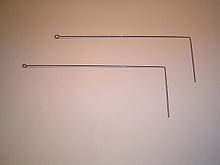Re: property line quest -- what would you do
People are no damned good, and that includes rural prople.
Wow, such all encompassing negativity! I disagree, there are plenty good people out there, I'd venture to say more are good than bad.
I too live in a rural community. I ALWAYS get a survey when buying property, and mark my corners.
As for adverse possession, these minimum criteria must be met,
EDIT*
http://en.wikipedia.org/wiki/Adverse_possession *
EDIT (special thanks to Tim Frank for keeping the internet a nice place to visit!) 
* Actual possession of the property
* Open and notorious use of the property
* Exclusive use of the property
* Hostile or adverse use of the property
* Continuous use of the property
Actual possession: the disseisor must physically use the land as a property owner would, in accordance with the type of property, location, and uses. Merely walking on land, or hunting, does not establish actual possession.[6] His actions must change the state of the land, as by clearing, mowing, planting, harvesting fruit of the land, cutting timber, mining, fencing, pulling stumps, running livestock and constructing buildings or other improvements.
Taxes: paying taxes does not establish actual possession, but may be admitted by some courts as evidence of claim of right. For example, if the true owner regularly pays taxes on the land, even while a disseisor has taken actual possession of the land by his regular use and improvement of it, the true owner's payment of taxes does not affect the disseisor's actual possession. However, if the disseisor were to pay taxes over the same period that he was using and improving the land, the court might find that his payment of taxes was evidence that he believed he had a "claim of right" to the land.
Open and notorious: the disseisor's use of the property is so visible and apparent that it gives notice to the legal owner that someone may assert claim. It must be of such character that would give notice to a reasonable person. If legal owner has knowledge, this element is met; it can be also met by fencing, opening or closing gates or an entry to the property, posted signs, crops, buildings, or animals that a diligent owner could be expected to know about.
Exclusive: the disseisor holds the land to the exclusion of the true owner. Renters, hunters or others who enter the land with the permission of the true owner fail to have exclusive possession. (Note: There may be more than one adverse possessor, taking as tenants in common, so long as the other elements are met.)
Hostile or adverse: objective view--used without true owner?s permission and inconsistent with true owner?s rights. Bad faith or intentional trespass view--used with the adverse possessor?s subjective intent and state of mind (mistaken possession in some jurisdictions does not constitute hostility). Good faith view--a few courts have required that the party mistakenly believed that it is his land. All views require that the disseisor openly claim the land against all possible claims.
Continuous: the disseisor must, for statute of limitations purposes, hold that property continuously for the entire limitations period, and use it as a true owner would for that time. This element focuses on adverse possessor?s time on the land, not how long true owner has been dispossessed of it. Occasional activity on the land with long gaps in activity fail the test of continuous possession. Courts have ruled that merely cutting timber at intervals, when not accompanied by other actions that demonstrate actual and continuous possession, fails to demonstrate continuous possession. If the true owner ejects the disseisor from the land, verbally or through legal action, and after some time the disseisor returns and dispossesses him again, then the statute of limitation starts over from the time of the disseisor's return. He cannot count the time between his ejection by the true property owner and the date on which he returned.




















